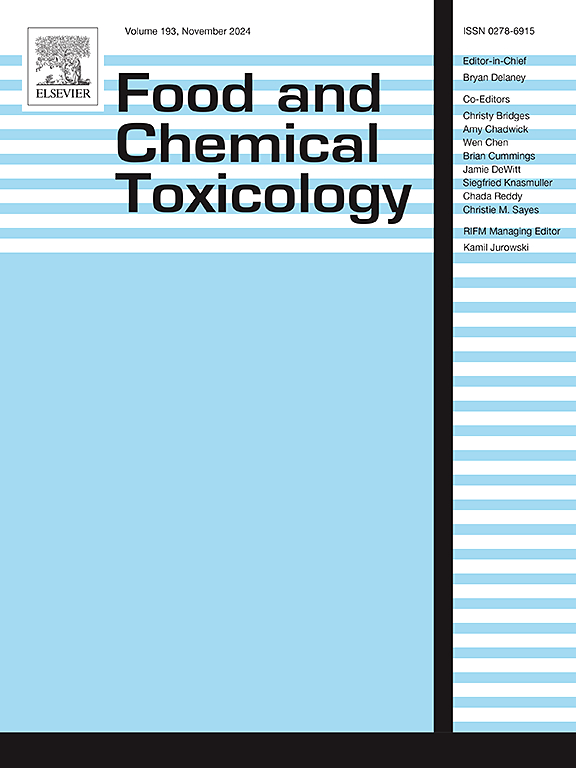Coconut oil reduces steroidogenic enzymes and imbalances estrogen receptors in the adrenal cortex of Mongolian gerbils
IF 3.9
3区 医学
Q2 FOOD SCIENCE & TECHNOLOGY
引用次数: 0
Abstract
This study aims to verify the effects of prolonged ingestion of coconut oil on the adrenal glands of Mongolian gerbils. Mongolian gerbils were used as an experimental model due to the morphological similarity of the adrenal glands to those of primates. Male Mongolian gerbils, 3 months of age, were divided into three experimental groups (n = 12): an intact control group, which received no treatment, a gavage control group, which received 0.1 ml of water daily by gavage, and a coconut oil-treated group, which received 0.1 ml of coconut oil daily for 12 months. The results showed that prolonged consumption of coconut oil caused an increase in cell area and thickness of the zona reticularis and the accumulation of lipid droplets, as well as reducing the amount of steroidogenic enzymes, such as CYP17, 3BHSD, and 17BHSD. It was also observed that the oil increased the expression of estrogen receptor alpha and their isoforms. These alterations allow us to conclude that changes in the lipid diet can cause alterations in the morphophysiology of the adrenal gland and, consequently, impact its functionality.

椰子油减少类固醇酶和失衡雌激素受体在蒙古沙鼠肾上腺皮质。
本研究旨在验证长期摄入椰子油对蒙古沙鼠肾上腺的影响。由于蒙古沙鼠的肾上腺形态与灵长类动物相似,我们选择蒙古沙鼠作为实验模型。选取3月龄雄性蒙古沙鼠,分为3个实验组(n=12):完整对照组,不进行任何处理;灌食对照组,每天灌食0.1 ml水;椰子油处理组,每天灌食0.1 ml椰子油,连续12个月。结果表明,长时间食用椰子油导致网状带细胞面积和厚度增加,脂滴积聚,并导致CYP17、3BHSD、17BHSD等甾体生成酶的数量减少。还观察到精油增加了雌激素受体α及其同型异构体的表达。这些改变使我们得出结论,脂质饮食的改变会导致肾上腺形态生理的改变,从而影响其功能。
本文章由计算机程序翻译,如有差异,请以英文原文为准。
求助全文
约1分钟内获得全文
求助全文
来源期刊

Food and Chemical Toxicology
工程技术-毒理学
CiteScore
10.90
自引率
4.70%
发文量
651
审稿时长
31 days
期刊介绍:
Food and Chemical Toxicology (FCT), an internationally renowned journal, that publishes original research articles and reviews on toxic effects, in animals and humans, of natural or synthetic chemicals occurring in the human environment with particular emphasis on food, drugs, and chemicals, including agricultural and industrial safety, and consumer product safety. Areas such as safety evaluation of novel foods and ingredients, biotechnologically-derived products, and nanomaterials are included in the scope of the journal. FCT also encourages submission of papers on inter-relationships between nutrition and toxicology and on in vitro techniques, particularly those fostering the 3 Rs.
The principal aim of the journal is to publish high impact, scholarly work and to serve as a multidisciplinary forum for research in toxicology. Papers submitted will be judged on the basis of scientific originality and contribution to the field, quality and subject matter. Studies should address at least one of the following:
-Adverse physiological/biochemical, or pathological changes induced by specific defined substances
-New techniques for assessing potential toxicity, including molecular biology
-Mechanisms underlying toxic phenomena
-Toxicological examinations of specific chemicals or consumer products, both those showing adverse effects and those demonstrating safety, that meet current standards of scientific acceptability.
Authors must clearly and briefly identify what novel toxic effect (s) or toxic mechanism (s) of the chemical are being reported and what their significance is in the abstract. Furthermore, sufficient doses should be included in order to provide information on NOAEL/LOAEL values.
 求助内容:
求助内容: 应助结果提醒方式:
应助结果提醒方式:


